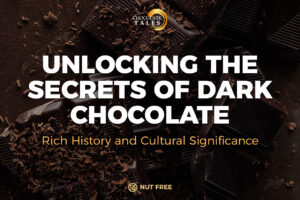Dark chocolate, the rich and decadent treat, has captivated taste buds and cultures worldwide for centuries. Beyond its irresistible flavour, this beloved confection holds a fascinating history and cultural significance that has transcended generations. From ancient Mesoamerican civilizations to modern-day health enthusiasts, dark chocolate has woven itself into the fabric of societies, becoming a symbol of indulgence, wealth, and even wellness.
The Origins of Dark Chocolate
The story of dark chocolate begins in the lush rainforests of ancient Mesoamerica, where the cacao tree, the source of cocoa beans, flourished. The Olmec, Maya, and Aztec civilizations were among the first to discover and revere the cacao bean, transforming it into a prized beverage reserved for royalty and religious ceremonies.
It was in the 16th century, when Spanish conquistadors encountered the Aztec culture, that the world beyond Mesoamerica was introduced to the enigmatic cacao bean. As the coveted beans made their way back to Europe, they sparked a chocolate craze that quickly spread across the continent, becoming a luxurious indulgence for the elite and wealthy.
The Evolution of Dark Chocolate
It was initially consumed as a bitter, frothy beverage, but chocolate transformed as European confectioners experimented with innovative techniques and added ingredients like sugar and spices. It paved the way for the creation of solid chocolate bars, marking a significant milestone in chocolate’s journey.
In the 19th century, the introduction of the hydraulic press and the development of the conching process by Rodolphe Lindt revolutionized the production of chocolate, resulting in a smoother, more refined texture. This technological advancement gave rise to the creation of dark chocolate, which we know today, with its rich, intense flavour and velvety mouthfeel.
Dark Chocolate Nutrition Benefits and Cultural Significance
As dark chocolate’s popularity soared, so did the recognition of its potential health benefits. Dark cocoa, the primary ingredient in dark chocolate, is a powerhouse of antioxidants, particularly flavanols, which have been linked to various health benefits, including improved cardiovascular health, cognitive function, and mood regulation.
Beyond its nutritional attributes, dark chocolate has long held a significant cultural and symbolic significance. In Mesoamerican cultures, cacao was associated with fertility, wealth, and even divine properties. In Europe, chocolate became a symbol of luxury and sophistication, enjoyed by the aristocracy and upper classes. Today, dark chocolate continues to be celebrated and revered in various cultures around the world. From the intricate chocolate-making traditions of Belgium and Switzerland to the artisanal bean-to-bar movement in the United States, dark chocolate has become a canvas for culinary creativity and artistry.
Is Dark Chocolate Good for You?
While dark chocolate is often lauded for its benefits, it’s important to strike a balance and consume it in moderation. The key lies in choosing high-quality dark chocolate with a higher cocoa content, typically 70% or higher, which maximizes the beneficial compounds while minimizing added sugars and unhealthy fats.
When consumed mindfully and as part of a balanced diet, dark chocolate can be a delightful treat that not only satisfies cravings but also offers potential health advantages. However, it’s essential to remember that moderation is key, as dark chocolate is still a calorie-dense food, and overconsumption can lead to unwanted effects.
Conclusion
Dark chocolate’s journey from the ancient Mesoamerican civilizations to modern-day indulgence is a testament to its enduring attraction and cultural significance. Beyond its rich flavour, dark chocolate holds the promise of potential health benefits thanks to its antioxidant-rich cocoa content. As we continue to explore and appreciate this beloved treat, it’s essential to embrace its history, savour its decadence, and enjoy it mindfully as part of a balanced lifestyle. Dark chocolate’s allure lies not only in its taste but also in the stories and traditions it carries, making it a true culinary treasure.
FAQs
What are some key historical aspects of dark chocolate?
Dark chocolate has a rich history dating back thousands of years, originating from Mesoamerican civilizations such as the Olmecs, Mayans, and Aztecs. These ancient cultures revered chocolate for its divine properties and used it in religious rituals and ceremonies.
How has dark chocolate influenced different cultures over time?
Dark chocolate’s cultural significance extends across various civilizations. From its revered status as a luxurious delicacy in European courts during the Renaissance to its integral role in traditional celebrations, dark chocolate has left an indelible mark on global cultures.
Is there a recommended daily intake of dark chocolate?
There is no official recommended daily intake for dark chocolate, as it depends on various factors like age, activity level, and overall diet. However, most experts suggest limiting dark chocolate consumption to around 1-2 ounces (30-60 grams) per day to reap its potential benefits while avoiding overconsumption.
What are the benefits of dark chocolate?
Dark chocolate is renowned for its potential health benefits, thanks to its high cocoa content. It contains antioxidants that can help reduce inflammation, improve heart health by lowering blood pressure and cholesterol levels, and even boost mood by stimulating the release of endorphins.
How can I choose high-quality dark chocolate?
When selecting dark chocolate, look for bars with a high cocoa percentage (70% or higher), minimal added sugars, and high-quality, sustainably sourced ingredients. Additionally, opt for dark chocolate made from single-origin beans for a more unique and flavorful experience.


